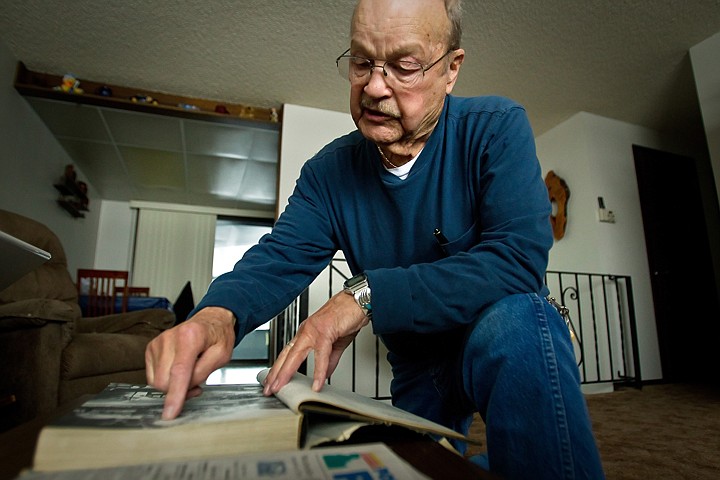Remembering Pearl
POST FALLS--Charlie Imus was walking down stairs from the barracks to a mess hall on Ford Island, a Naval air station at Pearl Harbor, when all hell broke loose.
It was Dec. 7, 1941.
"No breakfast that day," recalled the 90-year-old Post Falls man. "I didn't get any because of the attack."
Today marks the 69th anniversary of Japan's attack on Pearl Harbor. The next day, the United States declared war on Japan, resulting in this country's entry into World War II.
Imus, 21 at the time, was a Seaman 2nd Class assigned to the Navy's VP-23, an aircraft patrol squadron on Ford Island. During the first attack, personnel were ordered to remain in their barracks until there was a lull, Imus said.
"From my bunk, you could look out and see the battleships," Imus said.
Afterward, he was instructed to report to the hangars where the airplanes were.
"I was one of the first to arrive in the ordnance shop," he said. "I did get a rifle and fired a few rounds at a Japanese airplane."
The damage to the Navy's grounded planes, Imus said, was devastating.
"All of our planes were destroyed except for one," he said. "The story was that our commanding officer put on a flight suit and got one plane operational to launch for our squadron."
In total, 33 of the 70 aircraft on the ground at Ford Island that day were destroyed.
In the harbor, four Navy battleships were sunk and four others damaged. The Japanese also sank or damaged three destroyers, three cruisers, a minelayer and an anti-aircraft training ship.
There were 2,402 Americans killed and 1,282 wounded.
Imus said none in his squadron died at Pearl Harbor, and he's forgotten a lot of the chaos.
"I don't have a strong recollection of anything other than the general explosion of bombs," he said. "You could hear the explosions, particularly the air bombs, but the torpedoes were somewhat muffled."
Imus said barracks on the island became a hospital to treat injured sailors.
"The barracks became a pure mess with guys who had jumped in the water and swam through the oil and flames," he said.
Imus said that he and others in his squadron thought the worst - that a land attack on the island may occur - but that never happened.
"If they'd come in sufficient numbers, we would've had a helluva fight on our hands," he said. "If they would have taken over the island, it would've extended the war that much longer."
One of Imus' most vivid memories around that time was of two men in his squadron who were transferred to Wake Island, including Richard Jacobs of Cottonwood, Idaho, where a Veterans of Foreign Wars post is named after him.
"I was between them when they made the announcement of who would go to Wake Island," Imus said.
Jacobs was wounded during the attack on Wake Island and died two days later. The other man who was beside Imus became a prisoner of war, but survived.
The Battle of Wake Island began simultaneously with the attack on Pearl Harbor and ended on Dec. 23, 1941, with the American surrender to Japan.
After Imus finished boot camp in San Diego in March 1941, he went to aviation machinist school, graduating first in his class of 128. He was then transferred to Ford Island in October 1941.
After the attacks, his skills on aircraft engines were utilized during the rebuilding process. He continued such work later when he was stationed on Whidbey Island near Seattle. Imus retired in 1961 after 20 years in the Navy.
Imus said, besides from being on Oahu while still on active duty, he hasn't been back to Pearl Harbor.
He said he's contemplating a return to remember that shocking day that led President Franklin D. Roosevelt to proclaim it "a date which will live in infamy" and pay tribute to those who died.
"I wouldn't want to go on the anniversary; I'd rather go on my own," he said quietly. "I'm not a great one for crowds."
Imus said he often thinks about the day, those in his air squadron, and what could have been.
"I still wouldn't buy a Japanese car to this day," he said. "You count your blessings when you go through something like that. It's been a long time now. There's not too many of us left."

